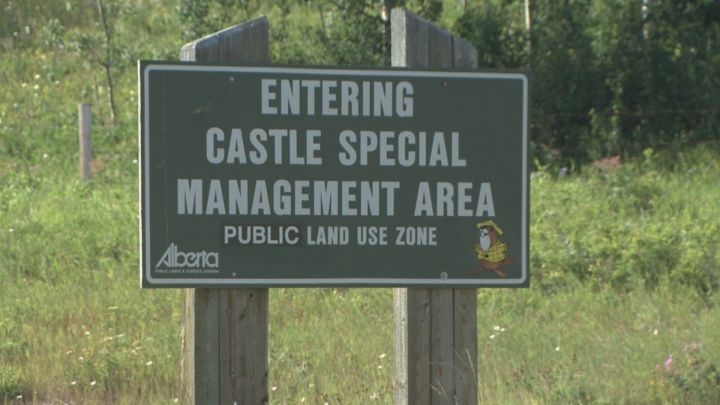Some Alberta hunters and anglers are seeking clarification from the government on how they’ll be impacted by plans for a provincial park and wildland area in the Castle region.

At the beginning of March, the NDP government confirmed it would not phase out off-highway trail access for at least the next year while it continues to draft a plan for the region.
READ MORE: Alberta to expand Castle area parks, phase out off-highway vehicles
At that time, the province also announced it would allow hunters to continue to recover game through a “limited use of trails” during the hunting season.
Brian Dingreville, with the Alberta Fish and Game Association, told News Talk 770’s Danielle Smith there is still a lot of uncertainty about what happens in 2019 and beyond.
READ MORE: Government of Alberta seeks public input on conservation plan for Castle area
He said that’s not the only confusion, adding that hunters and anglers are still unsure how to “legally” bring a weapon into the area.
“There is no consensus on whether we are going to be allowed to take a weapon into this area… We’ve had members contact Fish and Wildlife and we’ve had members contact Parks and both are stating they don’t know what the next step is,” he said.
“If you were to take a weapon into any provincial park today, you would have to have that rifle sealed. Probably, if you were to be caught with that weapon, I think the charges would be severe.”
In a statement, the government of Alberta’s environment ministry said hunting will continue under current regulations in both the Castle Wildland Provincial Park and Castle Provincial Park in the short term.
“In the longer term, a review will be undertaken to determine wildlife management priorities in the Castle Provincial Park,” said Brent Wittmeier, a spokesperson with the energy ministry. “This would lead to a tailored plan (a wildlife management unit with specific allocations) to meet conservation objectives in the park. Hunting will remain an important tool for managing species like elk and deer.”
He said, like in all provincial parks, a discharge permit is required to carry a gun. In wildland provincial parks the hunting licence is the permit, while in provincial parks a conservation officer must issue the discharge permit.
“If a hunter is carrying a gun between the two parks they would require a discharge permit for each, unless the firearm is encased,” he added.
Another hunting group in Alberta believes the government’s plan for the region could improve hunting opportunities.
- Invasive strep: ‘Don’t wait’ to seek care, N.S. woman warns on long road to recovery
- Ontario First Nation declares state of emergency amid skyrocketing benzene levels
- T. Rex an intelligent tool-user and culture-builder? Not so fast, says new U of A research
- Nearly 200 fossil fuel, chemical lobbyists to join plastic treaty talks in Ottawa
“If the motorized activities that are currently permitted within the Castle Mountain region is restricted that would actually cause the animals to start drifting back and obviously enjoy more of their natural habitat,” said Neil Keown, chair of Backcountry Hunters and Anglers.
He said higher road density in the region has actually pushed animals out of the area and deeper into the wilderness.
Dingrevile added that most hunters need to be able to access trails using off-highway vehicles to transport big game, like bear and elk.
READ MORE: Protesters rally against Alberta’s proposed phase-out of off-highway vehicles in Castle area
Keown said a hunting expedition would still be possible with restricted access to OHVs, but would require a little more planning.
He said the Alberta Fish and Game Association actually restricts OHVs on its own land and properties on the basis of destruction of habitat.
“Why would the Castle be any different?”
Wittmeier said the government is still in consultation about off-highway vehicles use, but said hunters using OHVs would need to move game to a designated trail.



Comments